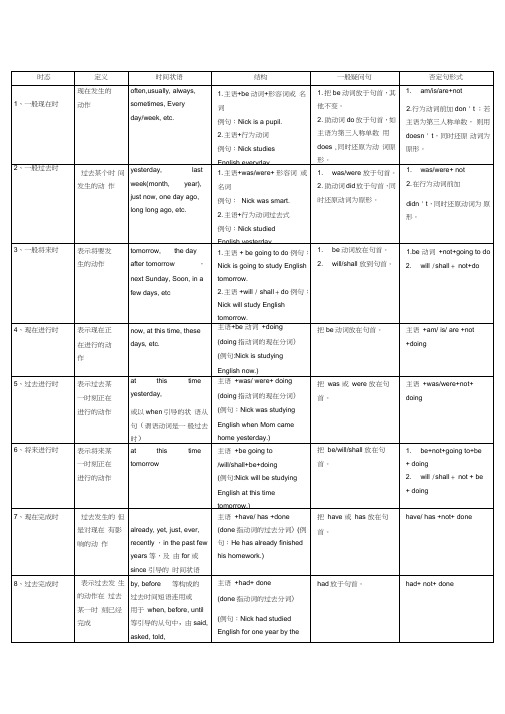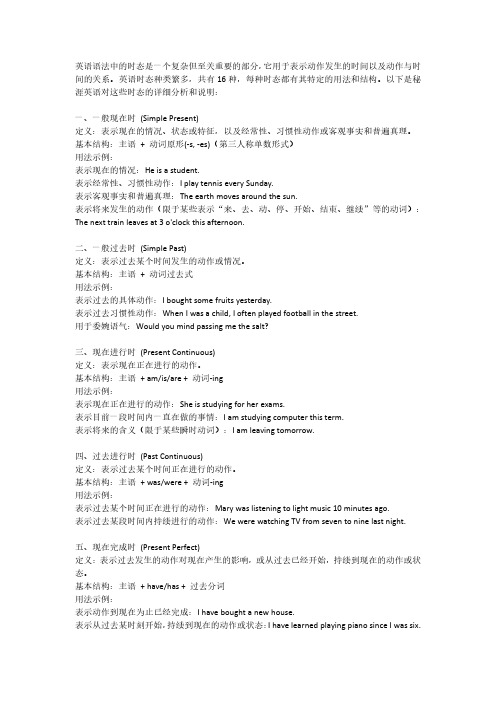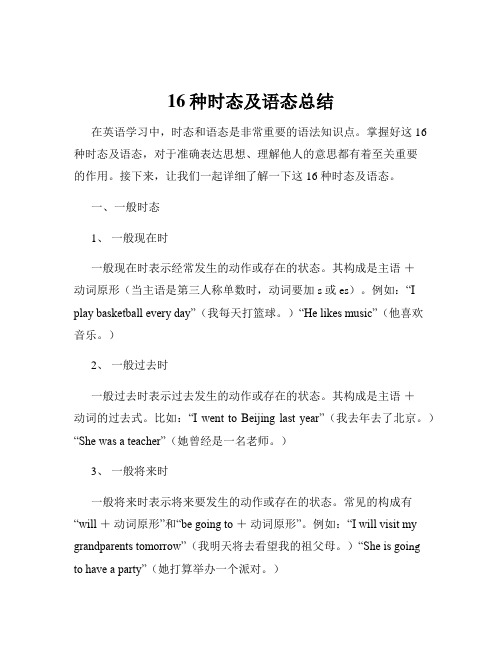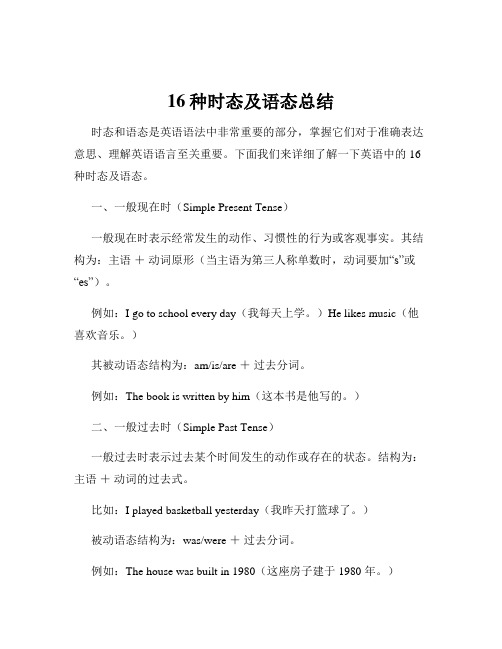专升本英语语法:16种英语时态(用法+例句)
(完整版)英语十六种时态表格(附准确例句)

过去发生的 动作到现在 还在继续进 行
Since this morning,
Since I was five, etc.
主语+have/has+been+ doing
(例句:Nick has been studyingEnglish since
this morning.)
把have/has放在句首。
wouldhavestudied
English for three months by the end of this year.
N/A
Would+not
16、过去将来完
成进行时
表示从过去 某时刻看,到 未来某时刻 以前会一直 在进行的动 作
常用于宾语从句中
例句:He said that Nick wouldhavebeen
1.把be动词放于句首, 其他不变。
2.助动词do放于句首, 如主语为第三人称单数 用does,同时还原为动 词原形。
1.am/is/are+not
2.行为动词前加don't; 若主语为第三人称单数, 则用doesn't,同时还原 动词为原形。
2、一般过去时
过去某个时 间发生的动 作
yesterday,last
把be/will/shall放在句
首。
1.be+not+going to+be
+doing
2.will/shall+not+be
+doing
7、现在完成时
过去发生的 但是对现在 有影响的动 作
already, yet, just, ever, recently,in the past few years等,及由for或since引导的时间状语
英语语法英语时态16种举例分析一看就懂【秘涯英语】001

英语语法中的时态是一个复杂但至关重要的部分,它用于表示动作发生的时间以及动作与时间的关系。
英语时态种类繁多,共有16种,每种时态都有其特定的用法和结构。
以下是秘涯英语对这些时态的详细分析和说明:一、一般现在时(Simple Present)定义:表示现在的情况、状态或特征,以及经常性、习惯性动作或客观事实和普遍真理。
基本结构:主语+动词原形(-s,-es)(第三人称单数形式)用法示例:表示现在的情况:He is a student.表示经常性、习惯性动作:I play tennis every Sunday.表示客观事实和普遍真理:The earth moves around the sun.表示将来发生的动作(限于某些表示“来、去、动、停、开始、结束、继续”等的动词):The next train leaves at3o'clock this afternoon.二、一般过去时(Simple Past)定义:表示过去某个时间发生的动作或情况。
基本结构:主语+动词过去式用法示例:表示过去的具体动作:I bought some fruits yesterday.表示过去习惯性动作:When I was a child,I often played football in the street.用于委婉语气:Would you mind passing me the salt?三、现在进行时(Present Continuous)定义:表示现在正在进行的动作。
基本结构:主语+am/is/are+动词-ing用法示例:表示现在正在进行的动作:She is studying for her exams.表示目前一段时间内一直在做的事情:I am studying computer this term.表示将来的含义(限于某些瞬时动词):I am leaving tomorrow.四、过去进行时(Past Continuous)定义:表示过去某个时间正在进行的动作。
英语专升本语法知识点汇总

英语专升本语法知识点汇总一、时态。
1. 一般现在时。
- 用法:- 表示经常或习惯性的动作或存在的状态。
例如:I go to school by bike every day.(我每天骑自行车去上学。
)- 表示客观事实或普遍真理。
例如:The earth moves around the sun.(地球绕着太阳转。
)- 结构:- 主语为第三人称单数(he/she/it等)时,动词要加 -s或 -es,如He likes reading. 其他人称用动词原形,如I like reading.2. 一般过去时。
- 用法:- 表示过去某个时间发生的动作或存在的状态。
例如:I visited my grandparents last weekend.(我上周末去看望了我的祖父母。
)- 结构:- 动词一般用过去式形式。
规则动词的过去式一般在词尾加 -ed,如work - worked;不规则动词有其特殊的过去式形式,如go - went。
3. 一般将来时。
- 用法:- 表示将来某个时间要发生的动作或存在的状态。
例如:I will go to Beijing next month.(我下个月将去北京。
)- 结构:- 常见的结构有will+动词原形,be going to+动词原形(表示计划、打算做某事或有迹象表明即将发生某事)。
如He is going to have a party tonight.(他今晚打算举办一个聚会。
)4. 现在进行时。
- 用法:- 表示现在正在进行的动作或存在的状态。
例如:She is reading a book now.(她现在正在读一本书。
)- 结构:- be动词(am/is/are)+动词的 -ing形式。
5. 过去进行时。
- 用法:- 表示过去某个时刻或某段时间正在进行的动作。
例如:I was watching TV at 8 o'clock last night.(昨晚8点我正在看电视。
英语十六种时态及用法

英语十六种时态及用法时态(Tense)是表示行为、动作和状态在各种时间条件下的动词形式。
因此, 当我们说时态结构的时候,指的是相应时态下的动词形式。
英语时态分为16种:一般现在、一般过去、一般将来、过去将来时,以及这四者的进行时、完成时和完成进行时1. 一般现在时用法:A)表示现在发生的动作、情况、状态和特征。
B)习惯用语。
C)经常性、习惯性动作。
例:He always helps others. (他总是帮助别人。
)D)客观事实和普遍真理。
尤其要注意,如果前后文不是一般现在时,则无法保持主句、从句时态一致。
E)表示一个按规定、计划或安排要发生的动作,(仅限于某些表示“来、去、动、停、开始、结束、继续”等的动词)可以与表示未来时间的状语搭配使用。
常见的用法是:飞机、火车、轮船、汽车等定期定点运行的交通方式。
例: The next train leaves at 3 o'clock this after noon.(下一趟火车今天下午3点开车。
)How ofte n does this shuttle bus run? (这班车多久一趟?)F)在时间和条件状语从句里经常用一般现在(有时也用现在完成时)表示将来事情。
例: When you have finished the report, I will have waited for about 3 hours.(等你完成这份报告的时候,我就已经等了将近3个小时了。
)2. 现在进行时(be doing)用法:现在正在进行的动作。
3. 现在完成时(have done)用法:A)表示动作到现在为止已经完成或刚刚完成。
例: I bought a new house, but I ________ my old one yet, so at the momentI have two houses.A) did n't sell B) sold C) have n't sold D) would sell 答案是C) have n't sold 。
英语语法大全之16种时态(1)

英语语法大全之16种时态时态(Tense)是表示行为、动作和状态在各种时间条件下的动词形式。
因此,当我们说时态结构的时候,指的是相应时态下的动词形式。
1. 一般现在时英语时态分为16种:一般现在、一般过去、一般将来、过去将来时,以及这四者的进行时、完成时和完成进行时。
用法:A) 表示现在发生的动作、情况、状态和特征。
B) 习惯用语。
C) 经常性、习惯性动作。
例:He always helps others. (他总是帮助别人。
)D) 客观事实和普遍真理。
尤其要注意,如果前后文不是一般现在时,则无法保持主句、从句时态一致。
E) 表示一个按规定、计划或安排要发生的动作,(仅限于某些表示“来、去、动、停、开始、结束、继续”等的动词)可以与表示未来时间的状语搭配使用。
常见的用法是:飞机、火车、轮船、汽车等定期定点运行的交通方式。
例:The next train leaves at 3 o'clock this afternoon.(下一趟火车今天下午3点开车。
)How often does this shuttle bus run? (这班车多久一趟?)F) 在时间和条件状语从句里经常用一般现在(有时也用现在完成时)表示将来事情。
例:When you have finished the report, I will have waited for about 3 hours.(等你完成这份报告的时候,我就已经等了将近3个小时了。
)2. 现在进行时(be doing)用法:现在正在进行的动作。
3. 现在完成时(have done)用法:A) 表示动作到现在为止已经完成或刚刚完成。
例:I bought a new house, but I _________ my old one yet, so at the moment I have twohouses.A) didn't sell B) sold C) haven't sold D) would sell答案是C) haven't sold。
专升本英语语法与词汇

专升本英语语法与词汇.第一章时态英语中谓语动词的时态(Tense)是一种动词的形式,不同的时态用以表示在不同的时间完成的动作或保持的状态。
英语动词共有十六种时态,这里将重点讲解其中较常用的十种时态。
一、一般现在时( The Present Indefinite Tense)1. 用于表示客观事实, 现在反复发生或习惯性的动作以及存在的特征、状态等,常与often, always, sometimes, usually, once a week, every day, seldom等时间状语连用。
【例句】The earth revolves around the sun.The students get up at six thirty every morning.2.表示按计划或安排好的将来的动作,常使用arrive, be, go, start, stay等动词。
【例句】There is a dancing party tonight.The plane arrives in Beijing at three this afternoon.3.用在以as soon as, when, after, while, as, until, till, whenever, the monment,theminute, immediately, directly等引导的时间状语从句中或以if, unless, as/so long as, in case, provided that等引导的条件状语从句中,代替一般将来时。
【例句】I’ll ring you as soon as he comes back.If it is fine tomorrow we will go swimming.The machine starts running the moment the button is pressed.●注:if条件句中,有will出现时,will是情态动词,意义为“愿意”,“肯”。
16种时态及语态总结

16种时态及语态总结在英语学习中,时态和语态是非常重要的语法知识点。
掌握好这 16 种时态及语态,对于准确表达思想、理解他人的意思都有着至关重要的作用。
接下来,让我们一起详细了解一下这 16 种时态及语态。
一、一般时态1、一般现在时一般现在时表示经常发生的动作或存在的状态。
其构成是主语+动词原形(当主语是第三人称单数时,动词要加 s 或 es)。
例如:“I play basketball every day”(我每天打篮球。
)“He likes music”(他喜欢音乐。
)2、一般过去时一般过去时表示过去发生的动作或存在的状态。
其构成是主语+动词的过去式。
比如:“I went to Beijing last year”(我去年去了北京。
)“She was a teacher”(她曾经是一名老师。
)3、一般将来时一般将来时表示将来要发生的动作或存在的状态。
常见的构成有“will +动词原形”和“be going to +动词原形”。
例如:“I will visit my grandparents tomorrow”(我明天将去看望我的祖父母。
)“She is goi ngto have a party”(她打算举办一个派对。
)二、进行时态1、现在进行时现在进行时表示现在正在进行的动作。
其构成是“be(am/is/are)+现在分词”。
例如:“I am reading a book now”(我现在正在读书。
)2、过去进行时过去进行时表示过去某个时刻正在进行的动作。
其构成是“was/were +现在分词”。
比如:“He was playing football at this time yesterday”(昨天这个时候他正在踢足球。
)3、将来进行时将来进行时表示将来某个时刻正在进行的动作。
其构成是“will be +现在分词”。
例如:“I will be studying English at 8 o'clock tomorrow evening”(明天晚上 8 点我将正在学习英语。
16种时态及语态总结

16种时态及语态总结时态和语态是英语语法中非常重要的部分,掌握它们对于准确表达意思、理解英语语言至关重要。
下面我们来详细了解一下英语中的 16 种时态及语态。
一、一般现在时(Simple Present Tense)一般现在时表示经常发生的动作、习惯性的行为或客观事实。
其结构为:主语+动词原形(当主语为第三人称单数时,动词要加“s”或“es”)。
例如:I go to school every day(我每天上学。
)He likes music(他喜欢音乐。
)其被动语态结构为:am/is/are +过去分词。
例如:The book is written by him(这本书是他写的。
)二、一般过去时(Simple Past Tense)一般过去时表示过去某个时间发生的动作或存在的状态。
结构为:主语+动词的过去式。
比如:I played basketball yesterday(我昨天打篮球了。
)被动语态结构为:was/were +过去分词。
例如:The house was built in 1980(这座房子建于 1980 年。
)三、一般将来时(Simple Future Tense)一般将来时表示将来要发生的动作或存在的状态。
结构有多种,常见的有:will +动词原形;be going to +动词原形。
例如:I will visit my grandparents next week(下周我将去看望我的祖父母。
)She is going to have a party(她打算举办一个聚会。
)其被动语态结构为:will be +过去分词;be going to be +过去分词。
比如:The meeting will be held tomorrow(会议将在明天举行。
)The show is going to be cancelled(这个演出将要被取消。
)四、现在进行时(Present Continuous Tense)现在进行时表示正在进行的动作。
- 1、下载文档前请自行甄别文档内容的完整性,平台不提供额外的编辑、内容补充、找答案等附加服务。
- 2、"仅部分预览"的文档,不可在线预览部分如存在完整性等问题,可反馈申请退款(可完整预览的文档不适用该条件!)。
- 3、如文档侵犯您的权益,请联系客服反馈,我们会尽快为您处理(人工客服工作时间:9:00-18:30)。
专升本英语语法:16种英语时态(用法+例句)1、一般现在时(do/does;is/am/are)①表示现在的情况、状态或特征。
例:He is a student.他是一个学生。
②表示经常性、习惯性动作。
例:He always helps others.他总是帮助别人。
③客观事实和普遍真理。
例:The earth moves the sun.地球绕着太阳转。
④表示一个按规定、计划或安排要发生的动作。
仅限于某些表示“来、去、动、停、开始、结束、继续”等的动词,可以与表示未来时间的状语搭配使用。
常见的用法是:飞机、火车、轮船、汽车等定期定点运行的交通方式。
例:The next train leaves at3o'clock this afternoon.下一趟火车今天下午3点开车。
⑤在时间、条件和让步状语从句中经常用一般现在(有时也用现在完成时)表示将的来事情。
(即:主将从现原则)例:I will call you as soon as I arrive at the airport.我一到机场就会给你打电话。
When you have finished the report,I will have waited for about3hours.等你完成这份报告的时候,我就已经等了将近3个小时了。
2、现在进行时(am/is/are doing)①表示此时此刻正在发生的事情。
例:He is listning to the music now.他现在正在听音乐。
②表示目前一段时间内一直在做的事情,但不一定此时此刻正在做。
例:I am studying computer this term.这个学期我一直在学习计算机。
③现在进行时可以表示将来的含义。
a.瞬时动词的进行一定表将来。
例:I am leaving.我要离开了。
b.持续动词的进行只有有将来的时间状语或有将来语境中才表将来。
例:I am travelling next month.下个月我要去旅行。
④现在进行时与频度副词连用,表示说话者或褒义或贬义的感情色彩。
例:He is always helping others.他总是帮助别人。
(褒义)3、现在完成时(have/has done)①表示动作到现在为止已经完成或刚刚完成,强调对现在产生的影响。
例:I bought a new house,but I haven't sold my old one yet,so at the moment I have two houses.我买了一所新房子,但是还没有卖掉旧的,所以现在我又两所房子。
②表示从过去某时刻开始,持续到现在的动作或情况,并且有可能会继续延续下去。
此时经常用延续性动词。
时间状语常用since加一个过去的时间点,或for加一段时间,或by加一个现在时间。
例:Great as Newton was,many of his ideas have been challenged today and are being modified by the work of scientists of our time.虽然牛顿是个伟大的人物,但他的许多见解直到今天还在受到挑战,并且被现代科学家的工作所修正。
4、现在完成进行时(have/has been doing)表示某一动作开始于过去某一时间,延续或重复地出现至今,或将继续延续至将来。
例:We have been working on this project for over a month now.到目前为止,我们一直在处理那个项目,已经花了一个多月时间了。
5、一般过去时(did;was/were)①表示过去某个时间发生的动作或情况。
例:I bought some fruits yesterday.我昨天买了一些水果。
②表示过去习惯性动作。
例:When I was a boy,I often swam in that river.would/used to do:表示过去常常......例:The old man would sit on a bench in the quiet park and look at others for hours without doing anything or talking to anybody.老人过去常常坐在宁静的公园里的一条长椅上,看着其他的人,一坐就是数个小时,什么也不干,也不和任何人交谈。
He used to visit his mother once a week.他以前总是每周看望一次他的母亲。
6、过去完成时(had done)表示在过去的某个时间或动作以前已经发生的动作或已经存在的状态。
就是我们常说的"过去的过去"。
Until then,his family hadn't heard from him for six months.到那时为止,他家里已经有六个月没得到他的消息了。
7、过去将来时(would do)表示从过去的某个时间看将要发生的事。
例:I said on Thursday I should see my friend the next day.我星期四说我将于第二天拜访我的朋友。
8、过去进行时(was/were doing)①表示在过去具体的时间正在发生的动作。
例:Mary was listening to light music10minutes ago.10分钟前,玛丽正在听轻音乐。
②表示过去某个时间段内一直在发生的事情。
例:I was travelling in London last summer vacation.去年暑假我在伦敦旅行。
③过去进行时可以表示过去将来的含义。
a.瞬时动词的过去进行时一定表示过去将来的含义。
例:Then she said she was leaving.然后她说她要离开了。
b.持续动词的过去进行时只有在有过去将来的时间状语或过去将来的语境下才能表示过去将来。
例:She said that she was travelling the next day.她说她第二天要去旅行。
④过去进行时和频度副词连用可以表示说话者或褒义或贬义的感情色彩。
9、一般将来时(will do)(1)will do①表示主语主观意愿的将来。
例:I will send her a glass hand-made craft as her birthday gift.我将送给她一个玻璃的手工制品,作为给她的生日礼物。
②表示客观将来。
例:Fish will die without water.离开水,鱼会死。
③表示临时决定。
例:——Mary has been ill for a week.——Oh,I didn't know.I will go and see her.(2)am/is/are going to do①表示计划、打算做某事。
例:This is just what I am going to say.这正是我想说的。
②表示根据某种迹象看,很可能或即将发生的事情,表推测。
例:Look at the dark clouds in the sky.It's going to rain.看天上的乌云,要下雨了。
(3)am/is/are about to do表示“即将、正要”时,可用。
强调近期内或马上要做的事。
例:Don't worry,I am about to make a close examination on you.别担心,我马上就给你做一次仔细的检查。
(4)be to do①表示“按计划、安排即将发生某事或打算做某事”。
例:She is to be seen in the lab on Monday.星期一你准会在实验室见到她。
②该做或不该做的事情(语气上接近于should,must,ought to,have to),表示一种命令、规劝性语气。
例:You are to go to bed and keep quiet,kids.Our guests are arriving in less than5 minutes.孩子们,你们必须上床睡觉,不准吵闹。
我们的客人5分钟之内就要到了。
10、将来进行时(will be doing)表示在将来的某个具体时间正在发生的动作或事情。
例:Don't worry,you won't miss her.She will be wearing a red T-shirt and a white skirt at that time.别担心,你不会认不出她的。
她到时会穿一件红色的T恤衫和一条白色的短裙。
11、将来完成时(will have done)表示从将来的某一时间开始、延续到另一个将来时间的动作或状态,或是在某个将来时间完成,但对其后的另一个将来时间有影响的动作或状态。
就好象把现在完成时平移到时间轴的将来时时段一样。
例:The conference will have lasted a full week by the time it ends.会议从开始到结束将持续整整一个星期。
12、将来完成进行时(will have been doing)表示动作从某一时间开始一直延续到将来某一时间,是否继续下去,应视上下文而定。
例:By the end of next month,the project will have been being worked for3years.到下个月底为止,这项工程就已经不停地进行了3年了。
13、过去完成进行时(had been doing)表示某一动作一直延续到过去某一时间,是否继续下去,应视上下文而定。
例:The old clock had been being taken apart of and fixed up again for several times by my 10-year old son before I came back home.我回到家之前,我10岁大的儿子已经把这个旧钟表拆卸并重新组装了好几回了。
14、过去将来进行时(would be doing)表示就过去某一时间而言,将来某一时间或时间段正在进行的动作,主要用于从句中。
例:The government promised that a new highway would be being built next July.政府承诺说第二年7月将有一条新的高速公路正在修建。
15、过去将来完成时(would have done)表示就过去某一时间而言,将来某一时间之前所完成的动作。
